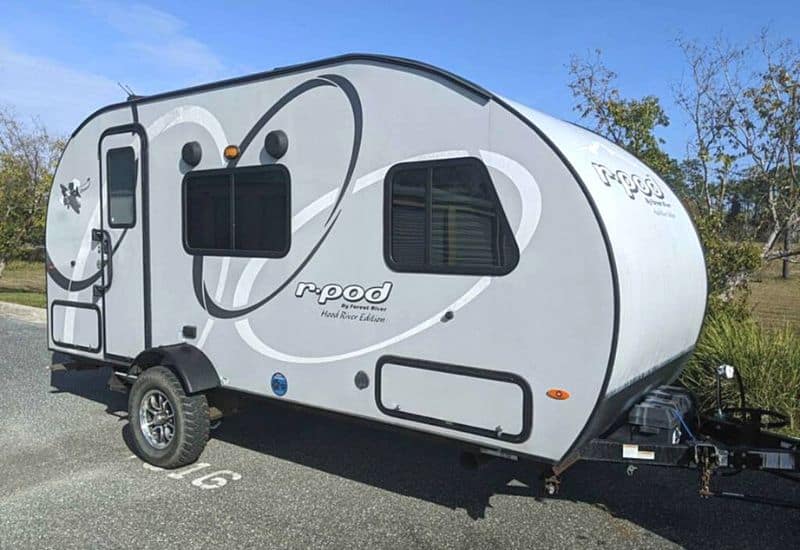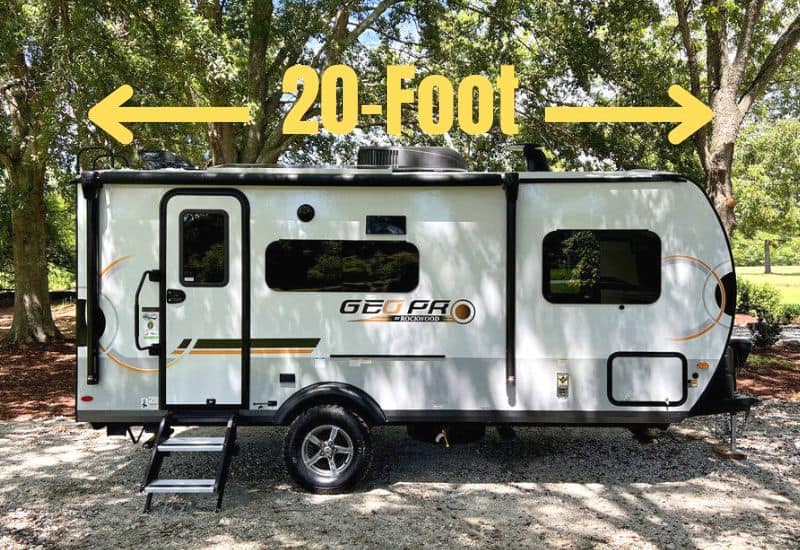Travel trailers come in all different lengths, from as short as 13 feet to as long as 41 feet, and everything in between.
One of the most popular camper lengths though is the 20-foot travel trailer.
As this trailer length offers a nice compromise between the smallest and largest travel trailers.
By offering more interior space and amenities compared to the smallest options, while at the same time maintaining a more manageable weight and length compared to the largest options.
Allowing the 20-foot travel trailer to be pulled by a variety of vehicles (more on this later).
If you’re thinking about purchasing or renting a 20-foot travel trailer though, you’re probably wondering how much they weigh.
As this will impact not only what type of vehicle you need to pull the trailer but also how much camping gear you can take along.
So how much does a 20-foot travel trailer weigh?
A 20-foot travel trailer will generally have a dry weight of between 2,500 and 4,000 pounds and a fully loaded weight of between 3,000 and 4,500 pounds.
Depending on the make and model of the trailer and the amount of cargo loaded into the camper.
If you’re looking for a more detailed answer, though, keep reading.
As we provide the dry weight, hitch weight, cargo carrying capacity, and gross vehicle weight rating on 12 of the most popular 20-foot travel trailers below.
How Much Does a 20-Foot Travel Trailer Weigh? (Lightest to Heaviest)
| Make/Model/Trim | Length | Dry Weight | Hitch Weight | Cargo Capacity | GVWR |
|---|---|---|---|---|---|
| 1. Coachmen Clipper 3K Series 17CBH | 20′ 5″ | 2,540 lbs | 330 lbs | 1,290 lbs | 3,830 lbs |
| 2. Gulf Stream Ameri-Lite Super Lite 177BH | 20′ 11″ | 2,810 lbs | 330 lbs | 1,020 lbs | 3,830 lbs |
| 3. Forest River R-Pod RP-180 | 20′ | 2,950 lbs | 332 lbs | 882 lbs | 3,832 lbs |
| 4. Winnebago Micro Minnie 1700BH | 20′ 9″ | 3,324 lbs | 414 lbs | 876 lbs | 4,200 lbs |
| 5. Forest River Flagstaff E-Pro E19FDS | 20′ 2″ | 3,360 lbs | 452 lbs | 1,092 lbs | 4,452 lbs |
| 6. Forest River Rockwood Geo Pro G19FBS | 20′ 2″ | 3,375 lbs | 479 lbs | 1,104 lbs | 4,479 lbs |
| 7. Airstream Basecamp 20X | 20′ 2″ | 3,400 lbs | 500 lbs | 900 lbs | 4,300 lbs |
| 8. Lance 1575 | 20′ 5″ | 3,590 lbs | 350 lbs | 1,010 lbs | 4,600 lbs |
| 9. Winnebago Hike H172BH | 20′ 7.5″ | 3,596 lbs | 518 lbs | 604 lbs | 4,200 lbs |
| 10. Grand Design RV Imagine Aim 16ML | 20′ | 3,768 lbs | 412 lbs | 1,027 lbs | 4,795 lbs |
| 11. Jayco Jay Feather Micro 171BH | 20′ 2″ | 3,775 lbs | 380 lbs | 1,220 lbs | 4,995 lbs |
| 12. Airstream Bambi 20FB | 20′ 7″ | 4,000 lbs | 540 lbs | 1,000 lbs | 5,000 lbs |
Understanding the Different Weights of a Travel Trailer
When it comes to travel trailer weight there are four main weights to be concerned with, including dry weight, hitch weight, cargo carrying capacity, and gross vehicle weight rating.
As all these different weights either directly or indirectly affect the most important weight of all when towing a travel trailer, which is the fully loaded weight of the trailer.
To get a better understanding of each of these weights and how they affect the fully loaded weight of a camper though, let’s take a closer look at each one individually.
Dry Weight (Unloaded Vehicle Weight)
One of the most cited weights of a travel trailer is its dry weight or unloaded vehicle weight, which is the curb weight of the trailer with empty tanks and nothing loaded inside.
This is the weight that’s listed on most travel trailer spec sheets as the weight of the trailer, which is true, as it’s the weight of the trailer as it comes from the RV manufacturer.
However, this weight is not the whole picture when it comes to the weight of the trailer and should only be used as a baseline when trying to figure out the true weight of a travel trailer.
As no one pulls a completely empty camper behind them when they go camping.
Leading us to the next important travel trailer weight that needs to be accounted for, which is cargo carrying capacity.
Cargo Carrying Capacity
The cargo-carrying capacity of a travel trailer is the amount of weight that can be safely loaded into the camper.
This includes camping gear, water, food, and any other items loaded into the camper.
Typically, for a 20-foot travel trailer, this number is usually around 1,000 pounds, give or take a few hundred pounds, depending on the make and model.
However, just because the trailer and its axle or axles can handle the extra weight that doesn’t mean the tow vehicle can.
And this is where many RV beginners get into trouble.
Because while they usually account for the trailer’s dry weight, they fail to account for all the weight being loaded into the trailer.
And ultimately the fully loaded weight of the trailer.
Which can be problematic for many reasons.
As this provides a margin for error, makes challenging towing more manageable, and helps to protect the tow vehicle.
Gross Vehicle Weight Rating (GVWR)
A travel trailer’s gross vehicle weight rating (GVWR) is its maximum weight rating, or how much the trailer and its contents can weigh.
The manufacturer sets this number, and it should never be exceeded, as this is the maximum weight the trailer can safely handle.
Which is dictated by the trailer’s structural components, including the trailer’s axle, suspension, and frame.
Most 20-foot travel trailers will generally have a GVWR of around 4,000 pounds, give or take a few hundred pounds, depending on how large and how well-built the trailer is.
However, some 20-foot campers can have gross vehicle weight ratings as high as 5,000 pounds.
Also, as a helpful tip, if you’re having trouble figuring out what a trailer’s gross vehicle weight rating is, you can always add the dry weight of the trailer and its cargo-carrying capacity to come up with the number.
Hitch Weight
Often overlooked, the hitch weight of a travel trailer is another important weight to consider, as it indicates how much weight the trailer’s tongue places on the hitch of the tow vehicle.
Which is an important figure to know.
Because you don’t want to exceed the max hitch weight of a tow vehicle any more than you want to exceed its max tow capacity.
As this can cause all sorts of issues.
Including overloaded rear tires and suspension on the tow vehicle, unlevel ride height, and an unstable tow vehicle and trailer.
The good news though is that generally speaking if the tow vehicle can handle the fully loaded weight of the trailer it can usually handle the hitch weight as well.
However, this is not always the case.
As some travel trailer floorplans, such as front kitchen layouts, can have extremely heavy hitch weights.
So you always want to check to ensure that the tow vehicle can handle not only the trailer’s fully loaded weight but also its hitch weight as well.
Generally speaking though, most 20-foot travel trailers will have a hitch weight of around 400 pounds, give or take 50 pounds or so.
What Affects the Weight of a 20-Foot Travel Trailer?

While it might seem logical that all 20-foot travel trailers would have a similar weight, due to their similar length.
In practice, this is not the case.
As there can be as much as a 1,500-pound difference between the lightest and heaviest 20-foot travel trailers.
But why is this?
Well, to answer this question, let’s take a closer look at the biggest factors that can affect the weight of a 20-foot travel trailer.
Construction
One of the most significant factors that can affect the weight of a travel trailer is how the trailer is constructed and the materials used in the build process.
For example, premium 20-foot trailers will often use lightweight construction and materials, such as aluminum framing, fiberglass exteriors, and Azdel construction.
Which can have a big impact on the weight of the camper.
Slide-Outs
Another big factor that can affect the weight of a camper is whether the trailer has any slide-outs.
As even one slide-out can add significant weight to the trailer.
As the typical RV slide-out will often add around 800 pounds to the weight of the trailer.
Wide Body Construction
While different 20-foot travel trailers have similar lengths often only separated by a few inches that doesn’t mean they have similar widths.
As different travel trailers even ones with similar lengths can have different widths, which can add extra weight to the trailer.
For example, while some 20-foot campers have exterior widths of 7 feet, others have exterior widths of 8 feet.
Which not only adds interior space to the camper but also weight.
Amenities
Finally, how the trailer is outfitted with amenities can also impact how much the trailer weighs.
For example, if the trailer is outfitted with a bigger and heavier air conditioner, outdoor kitchen, or a larger battery system, this can quickly add several hundred pounds to the trailer’s dry weight.
How Does the Weight of a 20-Foot Camper Compare to Other Camper Lengths?
As you might expect, when comparing different camper lengths, generally speaking, the higher up in length you go, the heavier the trailer will be.
If you’re trying to figure out how much weight though, we’ve included some of the most popular trailer lengths below and their corresponding average weights.
| Travel Trailer Length | Average Dry Weight |
|---|---|
| 18-Foot Travel Trailers | 2,000 – 3,000 lbs |
| 20-Foot Travel Trailers | 2,500 – 4,000 lbs |
| 22-Foot Travel Trailers | 3,000 – 4,500 lbs |
| 24-Foot Travel Trailers | 3,500 – 5,000 lbs |
| 26-Foot Travel Trailers | 4,500 – 6,000 lbs |
| 28-Foot Travel Trailers | 5,000 – 6,500 lbs |
| 30-Foot Travel Trailers | 5,500 – 7,000 lbs |
As you can see from the above table, generally speaking, each additional two feet of travel trailer length adds an additional 1,000 pounds of weight to the trailer.
What Types of Vehicles Can Tow a 20ft Travel Trailer?

Thanks to the lighter weight of 20-foot travel trailers there are a wide variety of vehicles that can safely pull these campers.
Including not only full-size trucks but also many smaller trucks as well as some mid-size to full-size SUVs.
To get an even better idea though, of which vehicles can tow a 20-foot travel trailer, we’ve included the below list of popular vehicles that can generally tow a 20-foot camper, based on the vehicle’s current max tow capacity.
Vehicles that can Pull a 20-Foot Travel Trailer & Their Max Tow Capacities
- Honda Pilot – 3,500 to 5,000 Pounds
- Hyundai Santa Cruz – 3,500 to 5,000 Pounds
- Chevrolet Colorado – 3,500 to 6,000 Pounds
- Toyota Tacoma – 3,500 to 6,800 Pounds
- Jeep Grand Cherokee – 3,500 to 7,200 Pounds
- Toyota 4Runner – 5,000 Pounds
- Ford Explorer – 5,300 to 5,600 Pounds
- Ford Expedition – 5,900 to 6,000 Pounds
- Ford F-150 – 5,000 to 11,300 Pounds
- GMC Canyon – 6,000 Pounds
- Dodge RAM 1500 – 6,180 to 8,330 Pounds
- Nissan Frontier – 6,230 to 6,720 Pounds
- Lincoln Navigator – 6,200 to 8,300 Pounds
- Chevrolet Suburban 7,400 to 7,800 Pounds
- Ford Ranger – 7,500 Pounds
- Cadillac Escalade – 7,500 to 7,700 Pounds
- Nissan Armada – 8,500 Pounds
- Chevrolet Silverado 1500 – 8,900 to 11,000 Pounds
What is the Lightest Travel Trailer?

The lightest travel trailer is the Happier Camper HC1, which has a dry weight of 1,100 pounds and a length of 13 feet.
Designed to be pulled by the most limited of tow vehicles, the HC1, can be towed by many compact SUVs and even some 4-cylinders.
To see other ultra-lightweight campers, check out our blog post “What is the Lightest Travel Trailer on the Road Today?“.
What is the Heaviest Travel Trailer?
The heaviest travel trailer is the Jayco Eagle 334DROK, which has a dry weight of 11,375 pounds and a gross vehicle weight rating of 12,825 pounds.
In addition, thanks to the trailer’s length of 41 feet 2 inches, the Jayco Eagle 334DROK is also the longest travel trailer as well.
Because of this, only the largest and most capable tow vehicles, such as 3/4-ton and 1-ton trucks can safely handle the weight and size of this enormous camper.
To see other large and heavy travel trailers, check out our blog post “What is the Heaviest Travel Trailer?“.
Recent Posts
When cruising down the highway in your RV, the last thing you want is a tire blowout! Not only is it dangerous, but RV tire replacement isn't cheap, costing $200 to $300 per tire. The good news,...
Nothing ruins an RV adventure faster than a breakdown with no way to fix it. Because of this, every RVer should have a well-stocked RV tool kit for those unexpected roadside emergencies and campsite...

